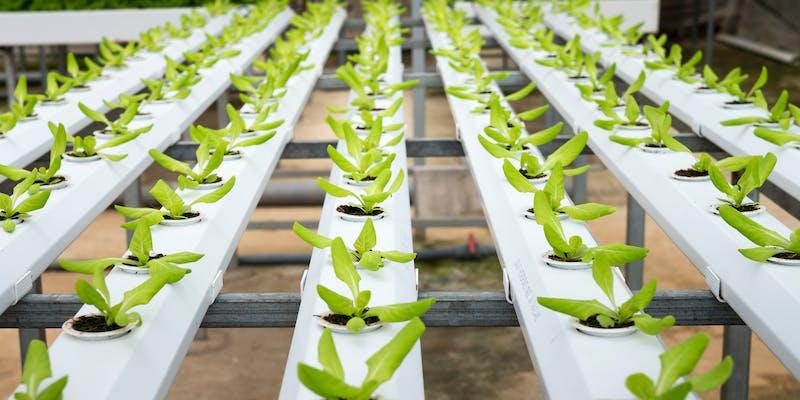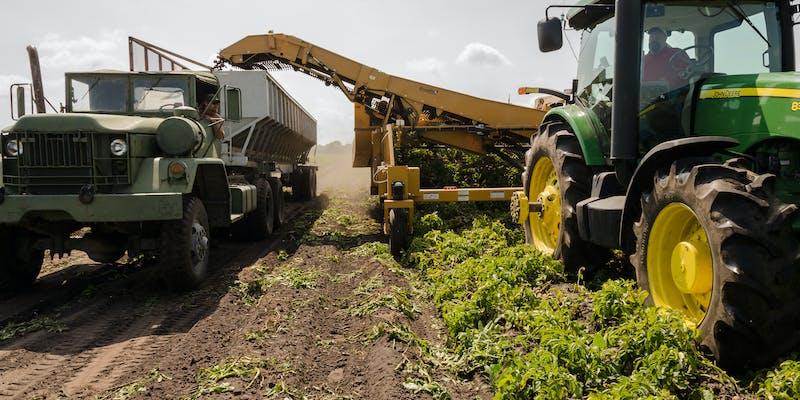Why Agritech Stocks are a Wise Investment Choice Today
Jan 19, 2024 By Susan Kelly
Rising incomes and population growth are driving food demand. Food and agricultural producers are also under pressure to reduce carbon emissions. Modern technology in agriculture can help achieve both goals. This sector is known for its preference for traditional methods, heavily relying on experience. Stephen Pickup, who leads the agriculture division at Traditum Private Equity, echoes this sentiment.
Even major agricultural corporations are not typically seen as pioneers of innovation. They often acquire smaller companies to integrate new technologies into their operations. However, the agricultural sector is anticipated to undergo a significant transformation, comparable to the post-World War II "green revolution," which saw a surge in production due to mechanization and fertilizers.
Driving Forces Behind the Transformation

The rapid advancement of technology in agriculture is due to its necessity. Despite slowing population growth predictions, Jeneiv Shah of Sarasin & Partners expects the world's population to rise between eight and nearly ten billion by 2050.
The population boom and rising wealth in developing economies will affect food consumption and quality. When income exceeds $10,000, people eat more protein and fewer grains and vegetables. Many people expect food demand to rise by half by 2050 based on a 1.2% annual growth rate for global consumption after 30 years. Urbanization, especially in developing nations, and climate change's frequent severe weather, droughts, and pests reduce arable land, worsening this problem.
Revolutionizing Agriculture with AI
The agricultural sector is being transformed by artificial intelligence (AI), a technology originating elsewhere. AgriSound CEO Casey Woodward highlights how AI improves farming. AI can improve weather predictions, farm management decisions, and extreme event predictions. The UK agricultural workforce is shrinking due to an aging farmer population and Brexit-exacerbated labor shortages, making this technological advancement crucial.
Natural language processing (NLP) systems outperform humans and help less experienced workers make nuanced decisions. Because retiring experienced employees lose their knowledge and experience, this is crucial. Additionally, farmers can use AI's massive data set to adopt greener practices. Bee population assessment is essential for biodiversity and pollination; AgriSound uses machine learning to evaluate sound samples. Marks & Spencer uses this agricultural technology in their supply chains. Data collection takes time and money, but AI applications like these need it. Robotics could reduce this load.
Lorenzo Conti invented the Crover robot to monitor grain silos. The Crover finds grain moisture and temperature hotspots that other methods cannot. This technology aids early problem detection and crop aeration, cutting waste by 80%.
Agricultural Stocks To Buy

Titan Machinery (TITN)
Titan Machinery is a leading agricultural and construction equipment company. KROP's ninth largest holding is 4.9% of its total. Titan has grown significantly since 1980. It now has 35 European and 74 US locations. The firm, part of CNH Industrial, represents well-known brands like Case and New Holland.
The company is prominent in agricultural states like Minnesota. Titan may be absent from Fertile, Minnesota, but it leaves a big impression. In the US's breadbasket, agricultural machinery is always in demand. Titan Machinery had strong fiscal 2023 growth. Revenue rose 29% to $2.2 billion. Its adjusted earnings per share reached a record $4.52 after rising 52%. According to CEO David Meyer, high demand and a supportive farm economy drove Agriculture's success.
The stock price of TITN is very appealing. Given its growth capacity, with a price-to-profits ratio under 7 and a charge-to-income ratio of 0.3, the TIT Verde Agritech stock appears undervalued. Titan machinery gives buyers a danger for an increase at an honest rate, no matter a 22% drop in stock price this year.
Corteva (CTVA)
Corteva, a prominent name within the agritech industry, holds the second-largest position in KROP's portfolio with a 13.1% weight. Born from the cut-up of DowDuPont in 2019, Corteva has set itself up as a committed agricultural organization. Shareholders of DowDuPont obtained 1 percent of CTVA for each of the three shares they held, and considering that then, CTVA's Verde Agritech stock has more than doubled, showcasing its increased trajectory.
Corteva's enterprise focuses completely on offering seed and crop safety solutions. It serves a full-size customer base, with over 10 million clients spread throughout a hundred and forty countries. This worldwide presence underscores the corporation's substantial role inside the agricultural zone.
The overall economic performance of Corteva in 2022 changed into noteworthy. The business enterprise generated $17.9 billion in organic sales, representing a 15% increase. Its operating EBITDA becomes $3—2 billion, up 25%, translating to an impressive margin of almost 18%. CTVA's modern-day earnings yield is 2.7%, closer to the minimum price of its variety because of its established order in 2019.
John Deere
John Deere, a prominent stakeholder in the agritech sector, is denoted on the New York Stock Exchange by the symbol DE. John Deere, which carries a 4.4% weight in the KROP portfolio, is not merely a well-known brand but an industry leader in agricultural technology.
The business achieved remarkable expansion in 2022. Their revenue increased by 19.4%, culminating in $52.6 billion. Comparably, net income increased to $7.1 billion. Notwithstanding these fantastic figures, the business enterprise's stock has experienced a decline, declining by about 11.5% year-to-date and 6% over the previous year.
Conversely, analysts retain an optimistic perspective regarding John Deere. 19 of 27 analysts advise a strong stock purchase, with an average target price indicating a potential increase of 28%. Daiwa analyst Jairam Nathan recently initiated stock coverage, establishing a target price of $440.
Sarasin UCITS
Those seeking a more comprehensive investment opportunity in the agritech industry should consider the Sarasin Food & Agriculture Opportunities UCITS Fund. Under the leadership of Jeneiv Shah and Colm Harney, this fund emphasizes international firms operating in the food and agriculture industries. A considerable proportion of its capital is allocated to investments made in the United States, Europe, and the United Kingdom.
The fund's principal holdings consist of Mowi ASA, a pioneer in fish farming, Bunge Limited, a major agribusiness firm in the United States, and Compass, a renowned food service provider. The fund's investment strategy provides diversified exposure to the sector at a recurring expense of 1.73%.

What Is SALT Deduction And Does It Work
Get the best tax-saving strategies, discover ways to maximize SALT deductions here, and optimize your tax game in 2024
Jan 14, 2024 Triston Martin

Your Guide to Buy Valero Energy Corporation Stock
Do you want to know about Valero Energy Corp? This article will provide stepwise guide to buy Valero Energy Corp stocks
Jan 12, 2024 Triston Martin

Decoding Form 2848: Power of Attorney and Declaration of Representative
This comprehensive guide elucidates the process of filling out IRS Form 2848, the role and responsibilities of an authorized representative, and common mistakes to avoid.
Jan 08, 2024 Triston Martin

Climate First Bank Review 2024
Climate First Bank looks at environmental-friendly banking choices, accounts for everyone, and connects money with social duty
Jan 13, 2024 Susan Kelly

Decoding the Success: How GEICO Car Insurance Lives Up to the Hype
Explore the success factors of GEICO, one of the top car insurance providers in the US, highlighting its customer-centric approach, financial stability, and innovative marketing strategies.
Jan 16, 2024 Triston Martin

Early Bird Benefits: The Advantages of E-Filing Your Taxes Now
Explore the advantages of e-filing taxes early, from mitigating tax fraud risks to securing quicker refunds and maximizing financial health.
Mar 21, 2024 Triston Martin